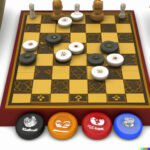In a world filled with high-tech gadgets and digital entertainment, it is truly remarkable how classic board games continue to captivate generations and stand the test of time. From nostalgic childhood memories to family gatherings, these games have the power to bring people together in a unique and meaningful way.
Whether you are young or old, new to the world of board gaming or a seasoned enthusiast, exploring the best classic board games list is bound to unlock hours of fun and create lasting connections.
Classic board games have a magical ability to transport players into another realm where imagination reigns supreme. They provide an escape from the daily grind and create spaces for social interaction that cannot be replicated by screens.
From rolling dice to strategizing moves, these games engage our minds and spark friendly competition like no other form of entertainment can. Whether it’s battling for world domination in Risk or trading properties in Monopoly, the enjoyment derived from playing these timeless classics is unmatched.
What makes classic board games even more special is their versatility. They cater not only to different tastes but also adapt seamlessly across generations. Grandparents can bond with grandchildren over a game they enjoyed as kids, passing down cherished traditions while creating new memories together. This ability to bridge generational gaps is one of the reasons why classic board games have endured throughout history, offering a common ground for families and friends to come together regardless of age or background.
So grab your closest companions, clear off that table, and prepare for countless moments filled with laughter, excitement, and camaraderie as we delve into the incredible world of classic board games. In the following sections, we will explore how to choose the right game for your preferences, examine their evolution over time, reveal the most popular classics to add to your collection, and discover how these games can be educational tools for children.
Get ready to unlock a treasure trove of timeless fun and create memories that will last a lifetime.
How to Choose the Right Classic Board Game for Your Taste
When it comes to choosing the right classic board game for your taste, there are a few factors that you should consider. This will ensure that you select a game that aligns with your preferences and provides an enjoyable experience. Here are some tips on how to choose the right classic board game for your taste:
1. Consider your interests: Think about the types of activities and themes that you enjoy. Whether you’re into strategy, word games, or trivia, there is a classic board game out there for every interest. Make a list of your favorite hobbies or topics and look for games that incorporate those elements.
2. Determine the level of complexity: Classic board games come in a wide range of complexity levels. Some games may be simple and straightforward, while others require more strategic thinking and planning. Consider how much time and effort you are willing to invest in learning the rules and strategies of a particular game.
3. Number of players: Classic board games vary in terms of the number of players they accommodate. If you plan on playing with a large group of friends or family members, make sure to choose a game that can handle multiple players. On the other hand, if you prefer solo gaming, look for options that can be played alone or have a single-player mode.
Once you have considered these factors, it’s time to do some research and read reviews on different classic board games that meet your criteria. Look for recommendations from fellow gamers who have similar interests as yours or seek advice from experts in the field. Remember, choosing the right classic board game for your taste ultimately depends on what brings you joy and satisfaction during gameplay.
The Importance of Classic Board Games in Connecting Generations
Classic board games have long been a staple in households around the world. They are not just a source of entertainment; they also serve as a bridge that connects generations. The importance of these games in connecting different age groups cannot be overstated.
One of the key reasons why classic board games are so effective in bringing people together is because they provide a common ground for everyone involved. Whether it’s playing chess with your grandparents or introducing your kids to the nostalgia of Monopoly, these games create opportunities for meaningful interaction and bonding. Not only do they allow families to spend quality time together, but they also facilitate conversations and shared experiences that can strengthen relationships.
Furthermore, classic board games offer an excellent opportunity for older generations to pass down their knowledge and skills to younger ones. As children learn the rules, strategies, and tactics of these games from their parents or grandparents, they not only develop critical thinking and problem-solving abilities but also inherit a valuable piece of family history. Moreover, playing board games as a family promotes healthy competition and teaches important life skills such as patience, sportsmanship, and negotiation.
To foster the connection between generations through classic board games, it is crucial to choose games that are suitable for all age groups involved. Consider games such as Scrabble, which challenges players’ vocabulary irrespective of their age; Clue, which encourages deductive reasoning; or even card-based games like Go Fish or Old Maid that can be enjoyed by young children alongside their grandparents.
The Evolution of Classic Board Games
Classic board games have a rich history that dates back centuries. These games have evolved and adapted over time, providing entertainment to countless generations. From ancient civilizations to modern adaptations, the evolution of classic board games is both fascinating and influential.
Ancient Origins
Many classic board games we enjoy today can trace their origins back to ancient civilizations. One such example is the game of Senet, which was played in Ancient Egypt around 3100 BCE. This game involved moving pieces along a board and was closely tied to religious beliefs about the afterlife.
Another ancient game is Chess, believed to originate from India in the 6th century. Through trade and cultural exchanges, Chess spread across Asia and eventually reached Europe, where it gained popularity during the Middle Ages.
The Influence of Industrialization
As societies entered the industrial era, advancements in technology impacted the production and distribution of classic board games. The introduction of mass printing techniques in the late 18th century allowed for more affordable production, making these games accessible to a wider audience. Advancements in materials, such as cardboard or plastic instead of wood or metal, also contributed to their affordability and increased availability.
Modern Adaptations
In recent years, classic board games have experienced a resurgence in popularity, thanks in part to modern adaptations and digital versions. Many popular classic board games now have digital editions available on smartphones or tablets, allowing people to play anytime and anywhere. Additionally, there are modern twists on traditional classics, incorporating new themes or variations to cater to different interests and age groups. These adaptations inject fresh life into these beloved games while staying true to their core mechanics.
The evolution of classic board games showcases their enduring appeal across time periods and cultures. Whether they originated thousands of years ago or were recently adapted for modern audiences, classic board games continue to captivate players of all ages. From the ancient strategy games to the modern cooperative and social ones, these timeless games have solidified their place in our hearts and homes.
The Most Popular Classic Board Games of All Time
Monopoly
One of the most iconic and beloved classic board games of all time is Monopoly. This game has been entertaining families and friends for generations with its strategy, luck, and competitive nature. The objective of Monopoly is to become the wealthiest player by buying, renting, or selling properties on the game board. With a combination of luck in rolling the dice and smart decision-making in managing one’s money and properties, Monopoly offers endless hours of entertainment.
Chess
Another classic board game that has stood the test of time is chess. Chess is a two-player strategy game that requires critical thinking, planning ahead, and strategic foresight. This ancient game has origins dating back to the 6th century and has been played by millions of people worldwide.
Each player has sixteen pieces that they strategically move across a square board with sixty-four squares. The ultimate goal in chess is to checkmate your opponent’s king – putting it under attack with no way to escape. Chess is not only a mentally stimulating activity but also promotes patience, concentration, and strategic thinking.
Scrabble
For lovers of words and language, Scrabble is often considered one of the best classic board games. This game challenges players to create words using letter tiles on a grid-style game board.
Each letter tile has a specific point value, and players aim to score as many points as possible by strategically placing their tiles on high-scoring squares or creating long words. Scrabble not only tests players’ vocabulary skills but also their ability to strategize for maximum point allocation on the board.
These are just three examples of the most popular classic board games of all time: Monopoly, Chess, and Scrabble. However, there are numerous other classics such as Clue, Risk, and Trivial Pursuit that have captured the hearts and minds of players around the world. Whether you prefer games of strategy, wordplay, or luck, there is a classic board game out there that is sure to entertain and engage players of all ages and backgrounds.
Strategy Games
Strategy games have long been a favorite among board game enthusiasts, as they provide a mental challenge and allow players to showcase their strategic thinking skills. These games require players to plan ahead, anticipate their opponents’ moves, and make decisions based on careful analysis of the game board and resources available. Strategy games range from ancient classics like Chess and Go to modern titles like Settlers of Catan and Risk.
One of the key elements that sets strategy games apart is the depth of gameplay. These games often have complex rules and mechanics that require players to think several steps ahead. They provide a platform for players to unleash their inner genius, allowing them to test their ability to strategize, problem-solve, and adapt to changing circumstances.
Not only are strategy games mentally stimulating, but they also offer hours of entertainment and can be enjoyed by players of all ages. They have the power to bring people together, fostering healthy competition and creating memorable experiences. Whether you’re looking for a casual game night with friends or a more competitive experience, strategy games are sure to deliver endless fun.
| Classic Strategy Games | Year Released |
|---|---|
| Chess | 6th century |
| Go | Ancient China |
| Risk | 1957 |
| Settlers of Catan | 1995 |
Strategy games have also had their fair share of evolution over time. From simple black-and-white game boards to beautifully designed and intricate setups, these games have kept up with the changing tastes and preferences of players. Modern adaptations often incorporate elements of technology, such as apps or digital components, to enhance gameplay and add new dimensions to the strategy.
Cooperative Games
Cooperative board games have gained significant popularity in recent years, as they offer a unique and engaging experience that fosters teamwork and collaboration among players. These types of games are designed to be played in a cooperative manner, where all players work together towards a common goal, rather than competing against each other.
This cooperative aspect adds an extra layer of excitement and challenge to the game, as players need to communicate effectively and make joint decisions in order to succeed.
One of the key benefits of cooperative board games is that they promote teamwork and collaboration. Players must actively communicate with each other, share information, and coordinate their actions in order to achieve victory. This type of gameplay encourages players to work together, listen to different perspectives, and find consensus on the best course of action. It also helps build important social skills such as communication, problem-solving, and critical thinking.
Moreover, cooperative board games foster a sense of unity among the players. The shared experience of working towards a common goal can create strong bonds among friends or family members. These games often require players to overcome challenges or obstacles together, which can lead to memorable moments of celebration and triumph when they achieve success as a team. Cooperative board games can bring people closer together by providing an enjoyable activity that promotes positive interaction and cooperation.
Social Games
One of the key features of social games is their ability to engage multiple players and encourage interaction. These games often involve elements of humor, creativity, and quick thinking, which make them highly entertaining for everyone involved. Whether it’s telling jokes, acting out funny scenarios, or engaging in friendly competition, social games have a way of bringing people together and creating memorable experiences.
Some famous examples of social board games include “Charades,” where players must act out a word or phrase without speaking; “Pictionary,” where players must draw clues for their teammates to guess; and “Apples to Apples,” where players match cards based on categories and try to come up with the most amusing combinations. These games not only provide hours of fun but also allow players to showcase their creativity and sense of humor.
Moreover, social board games can help break the ice and create a relaxed atmosphere among people who may not know each other well. They provide an opportunity for individuals to connect through laughter and shared experiences. It’s often the case that these types of games lead to inside jokes and lasting memories that become part of the group’s collective history.
Classic Board Games for Kids
Classic board games are not only a great way to entertain kids, but they also provide educational benefits. These games offer a combination of fun and learning, making them a valuable addition to any child’s playtime. Whether it’s improving cognitive skills, enhancing social interaction, or teaching important life lessons, classic board games for kids have it all.
One of the educational benefits of classic board games is the development of cognitive skills. Games like chess and checkers require logical thinking, strategizing, and problem-solving. By playing these games, children learn to plan ahead, make decisions based on limited information, and think critically. These skills can be applied in many aspects of their lives, including academics and real-world situations.
In addition to cognitive development, classic board games also encourage social interaction among kids. Games like Monopoly or Scrabble require players to communicate with each other, negotiate deals or exchanges and work together towards common goals. Through playing these games, children improve their communication skills, develop empathy towards others’ perspectives and learn how to cooperate as a team.
Furthermore, classic board games teach important life lessons such as patience and sportsmanship. Kids learn that winning or losing is part of the game and that it’s important to be gracious in both outcomes. They understand that waiting for their turn is necessary in order to play fairly and respect others’ time. These valuable life lessons contribute to their character development and help shape them into responsible individuals.
Overall, classic board games for kids provide a range of educational benefits while keeping them entertained for hours on end. From enhancing cognitive skills to fostering social interaction and teaching important life lessons – these games are a must-have for every child’s playtime collection. So why not introduce your child to the joy of classic board games today?
Conclusion
In conclusion, classic board games offer a timeless form of entertainment that has captivated players for generations. These games have stood the test of time because they bring people together, foster connection and create lasting memories. Whether you are a strategy game enthusiast, enjoy cooperative gameplay or prefer social games that bring laughter and fun to any gathering, there is a classic board game that suits your taste.
The importance of classic board games in connecting generations cannot be overstated. These games provide a shared experience for people of all ages, allowing grandparents to bond with their grandchildren over a friendly game of Monopoly or Scrabble. Through playing these games together, knowledge is passed down, relationships are strengthened, and memories are made.
It is fascinating to see how classic board games have evolved over time. From ancient times to modern adaptations, these games have adapted to changing tastes and preferences while maintaining their core gameplay elements. The enduring popularity of classics like Chess and Backgammon speaks to the universal appeal and strategic depth these games offer.
So why not delve into the world of classic board games? Whether you want to unleash your inner genius through strategy games or foster teamwork and collaboration through cooperative gameplay, there is a wealth of options available. Classic board games provide educational and entertaining experiences for kids as well, making them an ideal choice for family game nights or educational settings.
Frequently Asked Questions
What Are the Best Board Games of All Time?
The best board games of all time can be subjective and will vary depending on personal preferences. However, there are a few games that stand out as exceptionally popular and well-regarded by many. One example is “Monopoly,” a classic game that has been enjoyed by generations for its blend of strategy, luck, and negotiation.
Another popular choice is “Chess,” a centuries-old game that challenges players’ strategic thinking and foresight. “Scrabble” is another widely appreciated board game where players compete to create words using letter tiles. Lastly, “Catan,” a newer addition to the list, has gained immense popularity for its unique mechanics that involve resource management and trading.
What Is the Most Popular Traditional Board Game?
When it comes to traditional board games, one of the most popular choices worldwide is undoubtedly “Chess.” Originating in India over 1500 years ago, Chess has become a staple in households across the globe due to its rich strategic gameplay and competitive nature.
It has evolved into an internationally recognized sport with professional tournaments and players at the highest level. Its enduring popularity can be attributed to its simple yet complex rules that allow for endless possibilities and intellectual stimulation.
What Is the Oldest Popular Board Game?
Determining the oldest popular board game can be challenging due to the limited archaeological evidence available. However, one of the oldest known board games is believed to be “Senet,” which dates back approximately 5,000 years to ancient Egypt.
Senet was played on a grid-like board and involved strategy as players attempted to navigate their pieces across the squares while avoiding obstacles or capturing opponents’ pieces. This historical significance makes Senet an important predecessor in the development of modern board gaming trends and demonstrates how entertainment through gameplay has been valued throughout human history.

I love playing all kinds of games – from classics like Monopoly to modern favourites like Ticket to Ride.
I created this blog as a way to share my love of board games with others, and provide information on the latest releases and news in the industry.





